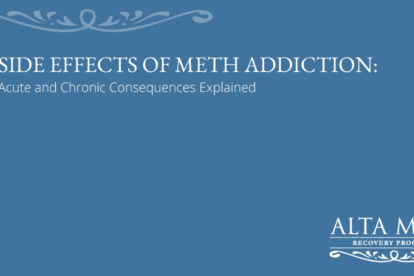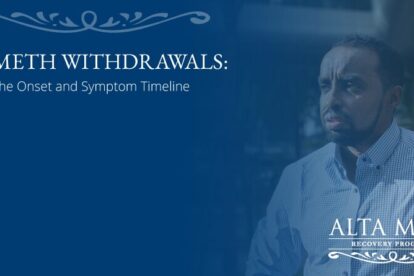
Meth Rehab Center
Methamphetamine addiction is a physical dependence on the stimulant drug. Using methamphetamine, more commonly referred to as meth, can lead to addiction, which in turn may cause serious harm including long-term health problems, mental illness, and potentially even death from an overdose. Meth addiction can be treated with residential treatment, ongoing behavioral therapies, and access to a strong support network, although there is no medication currently approved to treat this addiction.
What Is Methamphetamine Addiction?
Methamphetamine addiction is a brain disorder and a chronic condition in which a person cannot stop using the drug methamphetamine, or meth. Meth is a stimulant and a very addictive substance. When misused regularly it is possible for someone to become physically dependent on it. This means that the person is unable to control how much and how often they use it, they develop a tolerance to it, and they experience withdrawal if they try to stop using it.
As with other types of addiction, meth addiction can be very dangerous. It can cause long-lasting mental and physical health problems, and can even be fatal. It is also a treatable and manageable condition. With a commitment to a complete program of behavioral therapy and proven treatments, someone living with this addiction can make positive changes and get their life back.
Facts and Statistics About Meth
Methamphetamine is a highly addictive stimulant drug. A stimulant causes an increase in activity in the central nervous system resulting in greater alertness, higher blood pressure, a faster heart rate, and rapid breathing. While there are medical reasons to use stimulants, these are also drugs that are commonly misused, often to stay awake and be more alert or to get “a high.”
- Methamphetamine is listed as a Schedule II controlled substance by the Drug Enforcement Administration because of the high potential for misuse and dependence.
- Methamphetamine use is generally in decline, but there are regional variations. Parts of the Midwest still have a lot of meth use among residents.
- Meth can be used as a white powder or pill but is also used in crystallized form. This is known referred to as crystal meth or ice. Other street names for meth and crystal meth are crystal, speed, crank, shards, and chalk.
- Methamphetamine is often used by snorting, injecting, inhaling, or ingesting.
- As a prescription drug, methamphetamine is not often used but may be prescribed for narcolepsy, ADHD, or severe obesity that doesn’t respond to other treatments.
- Long-term effects of meth addiction include severe dental problems, sleeping problems, paranoia, extreme weight loss, anxiety, high blood pressure, aggression, and infectious diseases in those who inject, including hepatitis B and C and HIV.
Effective Treatment for Meth Addiction
According to research, behavioral therapies and residential treatment are the most effective treatments for meth addiction. People with other types of addictions may benefit from medications, but there is no approved drug to treat meth addiction. Cognitive behavioral therapy, contingency management, and motivational incentives have all been proven to help people recover from meth addiction and minimize relapses.
Behavioral therapies include using one-on-one therapy, family therapy, 12-step programs, and support in other areas of a person’s life, such as getting job skills and work, managing relationships, and finding affordable housing. Contingency management and incentives may also be used. This involves offering the patient incentives, like cash, to stay in treatment and to abstain from using methamphetamine or other substances.
Initial treatment is not necessarily the hard part of overcoming meth addiction. Where many people who have misused drugs like meth struggle is in avoiding relapse. A good treatment program should include strategies for minimizing or preventing relapses in the future. There are many ways in which a person can reduce the risk of having a relapse, including:
- A solid foundation of treatment at our luxurious residential facility.
- Committing to ongoing treatment or attendance at support groups, and not becoming complacent with sobriety
- Recognizing and avoiding high-risk situations and triggers
- Having a strong support network
- Creating and sticking with a daily routine that includes healthy habits
- Maintaining good physical health with adequate sleep, good nutrition, and plenty of exercise
- Having a plan of action ready in the event that a relapse does happen
Meth addiction is difficult to overcome, and the reality is that most people who struggle with any type of addiction will have a relapse at some point. In fact, relapse rates are similar to those seen in chronic physical conditions like diabetes. This means that, like those illnesses, addiction can be managed. If it is considered to be a chronic, lifelong condition, meth addiction can be managed with long-term treatment. The prognosis for those who have this outlook and who commit to ongoing treatment and self-care is good.
Signs and Symptoms of Meth Addiction
Signs that someone is addicted to meth are not the same as the symptoms of abusing the drug. Signs of actual addiction include cravings for more meth, being unable to limit the use of meth, needing to use more and more in order to get the same high or sense of euphoria, and experiencing withdrawal when not using. These are the characteristic signs of addiction to any substance, but there are also specific signs of meth use and addiction:
- Increased wakefulness, alertness, and activity levels
- Decreased appetite and weight loss
- Increased blood pressure
- Rapid breathing
- Increased body temperature, which can lead to fainting
- Severely itchy skin
- Disturbances in sleep patterns
- Rapid talking
- Anxiousness, nervousness, and mood swings
- Repetitive behaviors, like picking at skin or pulling out hair
- Aggression and violent behavior
Meth Addiction Causes and Risk Factors
The cause of meth addiction is meth misuse. Anyone who misuses methamphetamine is at risk for becoming addicted. While meth has a high potential for causing addiction, it is not instantly addictive, and it will not necessarily cause addiction in every person who uses it. The more often it is used and the larger the doses, the more likely a person is to develop an addiction. Some people may have more risk factors for addiction to meth or any other drug that go beyond abusing the drug regularly:
- Family history of drug use and addiction
- A personal history of addiction to other substances
- Engaging in risky behaviors of all types
- A personal history of psychiatric disorders
- An impulsive personality
- Poverty
- Easy availability of meth
On a chemical and biological level, what causes meth addiction is not fully understood. Studies of the effects of meth on the brain show that the drug causes changes in the structure and functioning of the brain; these changes could play a role in developing addiction. Imaging studies show that meth causes changes to the dopamine system, the chemical messaging system in the brain related to pleasure and rewards. It also causes changes to parts of the brain that are related to memory and emotions.
Knowing When It's Time for Meth Rehab
Meth addiction can be a difficult condition to overcome. But with treatment, support, and a strong relapse prevention plan, individual outcomes and quality of life can be improved. Alta Mira’s evidence-based meth addiction treatments, including supervised detox, residential care, and therapy, offer the intensity and duration necessary to go beyond stabilization to achieve lasting recovery.
For someone in the depths of meth addiction, recovery can feel like an unattainable goal. But it’s important to know that no matter how many times an addict has tried and failed, or how long they’ve been struggling with methamphetamines, recovery is possible. It’s never too late to get treatment.
When clients first walk through our doors at Alta Mira, many are unaware they may have an untreated mental health issue that is contributing to their struggle with opioid addiction. Treating the symptoms of the addiction alone may not lead to lasting recovery if the co-occurring disorder remains unrecognized and untreated. Our approach provides for the most accurate diagnosis possible, enabling our team to customize an effective treatment plan to fit your unique needs and goals, providing a pathway to a more authentic, productive, and healthy life.
Residential treatment for meth addiction is most effective because it allows an individual to focus on treatment for an extended period of time while learning the necessary skills for returning home and avoiding a relapse. Our meth addiction program is tailored to each individual and typically includes:
- Detox
- One-on-one behavioral therapy
- Group therapy and peer support
- Educational programs
- Family therapy
- Experiential and holistic therapies
- Intensive workshops
- Fitness/recreation
- Relaxation strategies and stress management
- Learning how to avoid relapses
Relapse prevention is an important part of treatment and includes learning what triggers methamphetamine use, how to avoid triggers, lifestyle changes, and learning and using healthy coping strategies.
How to Help a Loved One Get Treatment for Meth Addiction
Addiction is not a choice nor a sign of weakness. It is a condition of the brain that can respond to targeted treatment. When your loved one comes to Alta Mira, they will finally have a chance to be free from the debilitating effects of addiction.
While you can have an influence on your loved one’s decision to seek treatment, an individual struggling with meth addiction must take ultimate responsibility for their own recovery. Your support and encouragement may be what will finally convince them to seek help for their addiction to meth.
If you feel your loved one is in need of an intervention, our admissions team can work with you to help find the right interventionist to fit your family’s needs.
We're Here to Help. Call Today!
866-922-1350How Our Luxury Meth Rehab Center Transforms Lives
During your stay at Alta Mira, you’ll have an individualized treatment plan tailored to your specific needs. This will include comprehensive services for any co-occurring conditions that might be complicating or supporting your meth addiction.
- Comprehensive Neuropsychological Testing and Assessment
- Individualized Treatment Plans
- Evidence-Based Treatment Modalities
- Holistic and Experiential Therapies
- Luxurious Private Location
Our Transformational Meth Addiction Treatment Program
Your first 30 days of treatment at Alta Mira is referred to as your Detox, Stabilization, Assessment period, which begins with private, medically supervised detox. During this time, our detox specialists will keep you safe and secure, monitored 24/7, as you rest in the privacy of your own room.
You can also expect:
- Weekly meetings with a psychiatrist
- Weekly meetings with a medical doctor
- Neuropsychological testing and advanced psychological testing
- Orientation to our recovery fundamentals and self-regulation skills development
- In-depth family engagement and the option for loved ones to attend multiple 3-day family programs
- Introduction to therapy groups
Following 30 days of stabilization, clients move on to the next phase of their recovery process at Alta Mira, which we call our Transformational Program. Key elements of our complete 90-day transformational marijuana rehab program include:
- Three individual intensive psychotherapy sessions per week
- Weekly meetings with a medical doctor
- Participation in advanced workshops to support introspection, foundational change toward recovery, and relapse prevention
- Expanded neuropsychological assessment and continued weekly psychiatrist meetings inform tailored treatment adjustments and a refined individualized clinical approach
- Practice and integration of recovery principles and self-regulation skills and continued family work to support improved individual outcomes
- Intensive Workshops
Reclaim Your Life at Our Private Meth Rehab Today
We believe individuals are best able to focus on their recovery when immersed in a secure, serene, healing setting. That’s why we provide comfortable surroundings while maintaining the most advanced and sophisticated meth rehab program in Northern California. Clients can expect compassionate care from our best-in-class meth addiction specialists.
Seeking a helping hand to guide you through these difficult times is not an easy decision. Our caring and experienced team at Alta Mira can help guide you through the next steps toward achieving lasting recovery.
Don’t let meth addiction destroy your life. To begin your life-changing transformation, Contact us today.
Meth Addiction FAQs
Meth users not only run the risk of becoming addicted and suffering from both short- and long-term health problems, they are also at risk of overdosing. An overdose is a toxic amount that may kill the user if not treated immediately. Signs of an overdose may include:
- Chest pain
- Agitation
- Irregular heartbeat
- Stopped heart or heart attack
- Trouble breathing
- Extremely high body temperature
- Paranoia and confusion
- Severe abdominal pain
- Seizures
- Stroke
- Coma
An overdose is a medical emergency. Any observed signs should result in a call for emergency assistance. Treatment for a meth overdose may include using activated charcoal or laxatives to get the substance out of the body or neutralize it. Other treatments may depend on the symptoms the patient is experiencing: breathing support, IV fluids, restoring blood flow to the brain or heart, or treatments for damaged organs.
When someone is addicted to a mind-altering substance like methamphetamine, stopping use of the drug causes side effects that may be uncomfortable, painful, or even dangerous. This is called withdrawal. In order to recover from meth addiction, it is necessary to first get the drug out of the body. The process of doing that is called detoxification or detox. During the detox period, a person will experience withdrawal. Withdrawal is a major cause of relapse with any type of addiction.
Some of the symptoms of withdrawal that someone addicted to meth may experience include paranoia, itchy eyes, apathy, fatigue, difficulty sleeping, increased appetite, and decreased sex drive. Studies have also found that people detoxing from meth may have symptoms of depression and intense cravings for methamphetamine.






